
The Encyclopedia of Oklahoma History and Culture
CURRIN, GREEN I. (ca. 1842–1918).
Green I. Currin became the first African American to serve in the Oklahoma Territorial Legislature. According to published obituaries, Currin was born on October 20, 1842, in Williamson County, Tennessee, near the town of Franklin. However, the 1900 U.S. Census for Oklahoma Territory recorded 1844 as the year of his birth. Following emancipation, he lived in Nashville until he joined the great westward "exodus" movement. By 1877 he lived in Kansas, eventually establishing himself as a lawman in Topeka. Showing an interest in politics, Currin campaigned as the Republican nominee for the elected position of police judge but lost despite the fact that Topeka had fifteen hundred more registered Republican voters than Democrats.
Currin staked a claim in the Land Run of 1889 near Union Township in Kingfisher County, Oklahoma Territory. With a continued interest in politics and the support of Republican voters, he was one of five delegates elected to the House of Representatives from Kingfisher County. On August 27, 1890, Green I. Currin took his seat in the First Session of the Legislative Assembly of Oklahoma Territory. The day after his election, in Kingfisher three white men clubbed and seriously injured an African American named "Charlie." A reporter for the local paper described the incident as "Klu Klux [sic]" inspired. Realizing the increasing frequency of violent racial attacks against African Americans in the territory, Currin saw the need for legislative action. He introduced Oklahoma's first civil rights legislation, House Bill 119. Although the proposed law contained penalties for racial violence, the bill failed to become law by one vote.
Currin continued to perform as a respected and influential public servant after one term in the assembly. He served as a U.S. deputy marshal and was appointed to the Colored Agricultural and Normal College (now Langston University) Board of Regents in 1897. For the last nineteen years of his life he held the position of grand master of the St. John Grand Lodge, A. F. & A. M. Masonic Order of Oklahoma. He and his wife, Caroline, had five children: Henry, Janie, Winsor, Thomas, and Rosie. Green I. Currin died at his home in Dover on October 21, 1918, and was buried in Burns Cemetery.
See Also
AFRICAN AMERICANS, CIVIL RIGHTS MOVEMENT, FRATERNAL ORDERS–AFRICAN AMERICAN, GOVERNMENT AND POLITICS, LANGSTON UNIVERSITY






